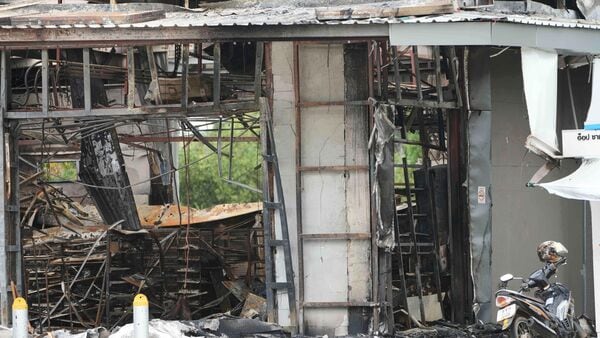The martial law is in effect in seven districts of Chanthaburi and one district of Trat.As the two nations continued to exchange heavy artillery fire on Friday, Thailand declared martial law in eight districts bordering Cambodia. Commander of the military’s Border Defense Command in the provinces of Chanthaburi and Trat, Apichart Sapprasert, said in a statement, “martial law is now in effect” in seven districts of Chanthaburi and one district of Trat.
The military border commander said that the decision was taken due to “Cambodia’s use of force” to enter Thai territory. The development comes just hours after Thai officials said that the country favours bilateral negotiations rather than third-party mediation to resolve the border dispute with Cambodia.
However, Thailand warned Cambodia that its conflict could “potentially develop into a war”, with acting prime minister Phumtham Wechayachai saying that Bangkok was committed to defending its territory and sovereignty. “We have tried to compromise as we are neighbours, but we have now instructed the Thai military to act immediately in case of urgency,” said Phumtham.
“This situation could potentially develop into a war,” Phumtham said, adding that, “At present, it is still considered an armed clash involving heavy weaponry.” Cambodia prime minister Hun Manet said that his country was ready for a ceasefire but accused Thailand of stepping out of a deal brokered by Malaysian PM Anwar Ibrahim. The truce was set to come into effect early on Friday.
According to Thailand’s health ministry, at least 15 people have lost their lives in one of the worst Thai-Cambodian clashes in more than a decade, with over three dozen people injured. Meanwhile, more than 1,30,000 civilians have been evacuated from conflict zones in Thailand. Cambodia has also 260 schools in the province of Oddar Meanchey, which is the center of the conflict. The United Nations Security Council is also set to hold an emergency meeting on the crisis later on Friday. The US, China and Malaysia have offered to mediate to de-escalate the growing tensions between Thailand and Cambodia.
Chinese foreign minister Wang Yi, earlier in the day, said Beijing is willing to play a constructive role in easing military conflict. Yi also blamed the border clash on the “legacy of western colonisers”. The US has also engaged both sides to resolve the conflict. The US embassy in Bangkok said in a statement that they “have consistently encouraged Thailand and Cambodia to resolve their differences peacefully in a manner that respects diplomatic obligations and norms.”
However, Thailand has reiterated that it would prefer resolving the matter through bilateral negotiations. “We do appreciate their kind offers and do not rule them all out,” Russ Jalichandra, vice minister for foreign affairs. He added, ““But at the moment we still want to solve the problems bilaterally through negotiations, and existing bilateral mechanisms that both sides agreed upon.”



